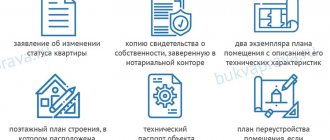Many citizens who want to take out an apartment on a mortgage cannot save money for a down payment. In order not to make a down payment, some buyers collude with the seller and artificially inflate the cost of the apartment being sold. Let's consider what overpricing an apartment with a mortgage is, what risks it carries for the seller and buyer, and whether it is profitable to do so.
Why inflate the value of real estate with a mortgage?
As mentioned above, the main reason why the parties resort to a transaction with an inflated value of real estate is the buyer’s lack of money for a down payment. Often this is no less than 20% of the cost of the apartment, which in large cities is a significant amount. It is in such situations that the need arises to inflate the cost of the property, get a loan and cover all expenses.
Another reason why people take out an overpriced mortgage is to buy an apartment without renovation. In this situation, borrowers often request a larger amount from the bank than is necessary for its purchase, and spend the remaining funds on home repairs.
Or the third option. The buyer simply needs cash for personal needs - purchasing a car or traveling.
It is the above reasons that push borrowers to take overpriced mortgages. This is not entirely fair and legal, but everyone gets their own benefit.
How does a bank calculate the maximum home loan amount?
Determining the maximum possible loan amount occurs in several stages:
- calculating the loan amount based on the level of income and the term chosen by the borrower;
- determination of the estimated value of real estate;
- final calculation of the amount taking into account the availability of funds for the down payment on the loan.
Difficulties may arise at every stage. However, with the right approach, they can be solved with minimal cost:
- If the borrower does not have enough income to obtain a mortgage for the required amount, the bank may offer to extend the loan term for several years. It’s worth agreeing to such a proposal: despite the prospect of overpaying interest, you can always make early partial or full repayment of the mortgage;
- when the apartment is priced cheaper than the buyer expected, you can look for another real estate option taking into account your needs;
- If the final amount offered by the bank is not enough to implement your plans to purchase a home, you can contact another credit institution.
Cadastral and market value: what is the difference?
Any property has 2 prices:
- Cadastral.
- Market.
The market price is the real, objective cost of the apartment. It depends on renovation, location, infrastructure, etc. This figure is also influenced by the general state of the real estate market and the competitiveness of housing: the first floor is cheaper than the rest, and other similar “rules”.
Cadastral price is the amount that is used to calculate property taxes. It is always below the market price. What is beneficial for the owner is that he pays less taxes. The cadastral value depends on the region where the housing is located. Each region has a certain coefficient that is used to calculate the price per square meter.
When obtaining a loan to purchase an apartment, it is important to know exactly its market value. It is she who is being overestimated.
How does overstatement work for a mortgage?
The easiest way to understand the mechanism of overestimation is with an example.
Boris wants to buy an apartment from Victor with a mortgage, but the bank requires a down payment of 20%. The buyer does not have that kind of money, and he plans to receive the missing amount as part of the loan itself.
To do this, Boris negotiates with Victor against a receipt stating that he has already allegedly transferred the amount of the first installment to him. It is best to draw up such agreements under the guidance of a lawyer. Otherwise, you may suffer from fraudulent activities on both sides.
At the next stage, Boris contacts an appraisal company and negotiates with the appraiser to inflate the value. Next, he submits the appraisal report and receipt to the bank, thereby proving that he has fulfilled the conditions for the down payment. Now he needs to wait for bank approval and get a mortgage. Finally, the parties draw up a purchase and sale agreement and conclude a deal.
Legal adviser Roman Azatyan answers:
Understating the cost of an apartment in a purchase and sale agreement means specifying the price of such residential premises below its market value. This is done when buying and selling apartments on the secondary real estate market. Moreover, the cost of such apartments, as a rule, is above 1 million rubles, and they were owned for no more than three years. The undervaluation of apartments is primarily associated with future reporting to the Federal Tax Service when filing a tax return, which reflects the income received from the sale of an individual, after which tax is payable to the state.
When issuing a mortgage loan, the undervalued cost of the apartment does not affect anything, because the borrower takes a specific amount, and banks are willing to enter into such transactions (almost all issue mortgage loans).
However, some banks may issue mortgages with certain conditions, including:
- increasing the down payment on a mortgage loan;
- interest rate increase;
- indication in the mortgage agreement of the loan amount, and not the cost of the apartment.
Thus, lowering the price when buying and selling an apartment is quite common nowadays, and you will not hear a categorical “no” from the bank. However, each bank has the right to formulate special conditions for concluding such transactions.
To whom do banks give a mortgage for an apartment, and to whom do they refuse?
Which secondary apartments are not worth buying? Legal aspects
When is it better not to overstate?
Such a scheme is questionable and cannot guarantee complete security for either party. Both the buyer and the seller must understand what they are getting into. This is especially true for the buyer, because he risks a little more.
There are 3 reasons that should stop you from making an overpriced transaction:
- The buyer does not have a stable income. This risks the fact that if an unfavorable situation occurs, he may not be able to pay the mortgage. The bank will take away the housing, and if the scheme is discovered, you may find yourself under investigation.
- The buyer has not established a trusting relationship with the seller. This is a complex psychological aspect. In matters such as real estate and money, you should hardly trust anyone other than your immediate family.
- The buyer chose an expensive apartment that is difficult to compare with competitors. In such a situation, the appraiser will most likely not agree to give a knowingly false report, because the deception here will be too obvious.
Buyer's risks when the mortgage is overstated
Taking out a mortgage on an apartment without investing any of your own funds into it is profitable and convenient. But remember that a scheme to inflate the cost of an object is illegal. This means that it has its own quite significant risks. Both sides take risks, but now let’s talk about what risks the buyer bears.
Risk 1. They will refuse a mortgage and blacklist you
Do not think that financial institutions are not aware of such fraud. When studying documents, bank specialists will definitely pay attention to the significant difference between the cadastral and market values.
Expert opinion
Alexander Nikolaevich Grigoriev
Mortgage expert with 10 years of experience. He is the head of the mortgage department in a large bank, with more than 500 successfully approved mortgage loans.
The mildest punishment that awaits the buyer is refusal of a loan. Then the buyer is blacklisted. Do not forget that banks transmit information about unscrupulous borrowers to the Credit Bureau, and in the future you will not be able to take out a loan from this or any other financial institution.
Risk 2. The seller will not return the overstated amount.
The bank transfers the entire value of the property to the seller. He, in turn, must give a certain part to the buyer. In this regard, situations may arise when the apartment owner simply refuses to do this. Therefore, it is necessary to draw up a receipt for the refundable amount. She won’t go to the bank, but she will protect the buyer.
Risks of an overvalued mortgage for the seller
An overpriced deal is much more beneficial to the buyer. The seller does not receive any objective benefits from such an agreement. In such a situation, he risks more than he wins. Let's consider the seller's risks with a mortgage with an overstated cost of the apartment.
Risk 1. Pay the full amount under the purchase and sale agreement if the transaction is declared invalid
For certain reasons, a transaction may be considered void and terminated. The reasons for this outcome may be violations of the property rights of incompetents or minors who were previously registered in this apartment.
Expert opinion
Alexander Nikolaevich Grigoriev
Mortgage expert with 10 years of experience. He is the head of the mortgage department in a large bank, with more than 500 successfully approved mortgage loans.
If a transaction is declared invalid, there will be a two-way restitution - a process that returns both parties to their original positions. That is, the seller will receive his apartment back, and the buyer will receive money in the amount specified in the sales agreement. If it was inflated, then the seller will have to give back exactly this inflated amount.
Risk 2. You will lose time if the buyer is denied a mortgage
Banks rarely issue loans in the amount of 100% of the cost of housing. As a rule, this is 80-90% of the price that expert appraisers will determine in their report. Even if the buyer agrees with the appraiser on the overstatement, the bank may draw attention to the significant difference between the market and appraised value and refuse the mortgage.
In such a situation, the seller will lose time, since he will be constrained by the terms of the preliminary agreement with the buyer.
Risk 3. You may become an accomplice to fraud.
As mentioned earlier, it is difficult to unambiguously understand such transactions and say who was to blame and who was not. Therefore, you can only buy an overpriced apartment with the consent of both parties. Both sides will be punished accordingly.
Risk 4: Pay more taxes if owned for less than 5 years
The law obliges all sellers who have owned real estate for less than 5 years to pay a tax of 13% of the value when selling it. If you overestimate the latter, then the tax amount will be higher. It is unlikely that it will be possible to resolve this issue with the buyer.
Risk 5. The buyer will demand the advance payment back
There is a risk that the receipt for the down payment amount will not be drawn up correctly. If the mortgage is rejected, the buyer can demand the seller return the non-existent advance. This is usually at least 20% of the cost of the apartment.
Expert opinion
Alexander Nikolaevich Grigoriev
Mortgage expert with 10 years of experience. He is the head of the mortgage department in a large bank, with more than 500 successfully approved mortgage loans.
The risks of an overpriced transaction are real and very unpleasant. Participation in such schemes sometimes leads to disastrous consequences, which is confirmed not only by the reviews of victims, but also by judicial practice. Therefore, you should not use such dubious schemes; it is better to carefully study the lending conditions of various banks and find one that provides a mortgage without a down payment.
Stages of the scheme with overestimation of the cost of an apartment
Let us consider in detail all the stages when carrying out a transaction using mortgage funds with an artificially completed value:
- Initially, you will need to choose a suitable real estate option. It is recommended to look for an apartment with one owner. The presence of accompanying factors complicates the transaction procedure.
- At the next stage, it is necessary to agree with the seller on artificially inflating the cost. The amount must be identical to the amount required by the banking company under a specific mortgage lending program.
- The seller writes a receipt for the advance payment. Accordingly, its size is identical to the difference between the artificially completed cost and the desired price for the sale of the apartment.
- The next step is to appraise the property. Accordingly, if the first scheme of artificially inflating the cost of an apartment is used, then one can only hope that the results of the appraiser will allow one to obtain a loan. When using the second scheme, you will first need to agree with the appraisal company on the need to inflate the value. Difficulties may arise if the appraiser is appointed directly by the banking company. In this case, it is quite difficult to come to an agreement, since appraisal companies may lose the trust of the bank if they disclose knowingly false information.
- Next, a preliminary purchase and sale agreement is drawn up between the seller and the buyer. It states the cost of the apartment, which was the result of an artificially inflated price.
- The buyer prepares the necessary package of documentation to be submitted to the banking company. In particular, you need to provide a receipt for the transfer of the advance payment to the seller.
- After completing the registration procedure for the provided documentation package, the banking company transfers the remaining funds to the seller.
Using a scheme with a contractual excess of the cost of residential premises to obtain a mortgage loan is a fairly popular method. This is due to the strong financial burden on the buyer due to current market prices. At the same time, many appraisers are ready to qualitatively prepare the appropriate package of documentation.
How to reduce risks?
The easiest way to reduce risks is to avoid agreeing to dubious schemes. Neither the buyer nor the seller knows what is in the other's head. Maybe the seller was initially looking for a buyer who needed to close the deal at an inflated price in order to profit from it. Or maybe it's quite the opposite. Unfortunately, no matter how the situation turns out, it will be difficult for the law to protect someone who signed the papers in their right mind and sober memory.
It is very important to try to protect yourself from unfavorable situations. And one of the options for such protection is a safe deposit box. There you can not only leave funds until you take ownership, but also freeze the money until all the terms of the contract are met.
Another option to reduce risks is to carry out all transactions only by bank transfer. After all, the transfer of funds from the buyer’s current account to the seller’s account is direct evidence that exactly the same amount was paid/received.
A step-by-step scheme for a safe overpriced mortgage transaction
Statistics say that approximately 3 out of 10 overpriced transactions are successful. This is because today the real estate market is so unpredictable and diverse that even the most daring figures in the cost of an apartment do not surprise appraisers and they are ready to put their signature on them.
An overpriced transaction consists of 7 steps:
- A suitable object is selected. It is better if it has only one owner. Otherwise, you can seriously complicate the situation with minor children, incompetents, etc. Let the real cost of the apartment be 2.6 million rubles.
- Next, you need to agree with the seller to record the inflated cost of housing in the documents. The buyer and seller sign a bilateral advance agreement for 650 thousand rubles (down payment 20%), indicating that the final cost of the apartment is 3.25 million rubles.
- The seller issues a receipt stating that he has received an advance in the amount of 650 thousand rubles.
- Now it is necessary to agree with experts so that they value the apartment at 3.25 million rubles. Let us immediately note that it is at this stage that everything can go wrong, since the assessment is often carried out by organizations that cooperate with the bank on an ongoing basis. Not all appraisal organizations will take such a risk. If the fraud is revealed, the bank will no longer cooperate with the company, and it will lose its source of profit.
- The buyer submits to the bank: an agreement with a value of 3.25 million rubles stated in it, an appraisal report where the apartment costs the same 3.25 million, and a receipt stating that he gave the required amount of the down payment to the seller.
- Next, it is necessary to formalize an agreement between the buyer and seller on the transfer of the advance payment.
- The bank approves the application, but issues, as is expected in such cases, only 75-80% of the value of the object. Which in our example is 2.6 million, or the real cost of the apartment.
Why do you need to increase the cost?
The procedure for purchasing real estate on credit or mortgage is as follows:
- the bank approves the loan and the buyer selects a suitable property;
- the appraisal company evaluates the collateral;
- The parties notarize a preliminary purchase and sale agreement and the buyer transfers the deposit to the seller. When purchasing on credit, the amount is equal to the down payment. The buyer's receipt presented by the seller to the bank confirms that the money has been received;
- re-register property rights in the MFC;
- a loan is issued at the bank, a mortgage is issued and the money is credited to the seller’s current account;
- register real estate encumbrances.
Recommended article: Rosselkhozbank mortgage without down payment
But it happens that the buyer does not have enough funds for the down payment, and then he turns to the seller with a request to inflate the cost of the property. The situation is typical for purchase and sale on the secondary market. The mortgage overestimation scheme looks like this:
- Suppose the property is sold at a price of 1 million rubles, of which initially 20%, or 200 thousand, which the buyer does not have, must be transferred as a deposit. He plans to receive this amount as part of the loan;
- the buyer agrees with the seller on a receipt indicating that the deposit in the required amount has been transferred. We will not give an example of how a receipt is written when the cost of an apartment is inflated. A sample receipt for a down payment on a mortgage is in the article: How to confirm a down payment on a mortgage. If the seller decides to formalize it, it is better to entrust the drafting of the document to an experienced lawyer or notary;
- the receipt is submitted to the bank as proof that the buyer has sufficient funds for the purchase;
- In order to receive a loan that would cover the starting amount, the market value of the property must be 1.25 million rubles, i.e. higher than objective data by 25%;
- For the “extra” amount, the buyer writes a receipt that the seller returned him 250 thousand. The reasons cited are deficiencies in the technical condition of housing.
From the above it follows that the parties have to draw up two types of receipts:
- in case of imaginary transfer of the down payment (deposit) - ;
Receipt for down payment in case of overpricing
- for the amount of the difference between the price specified in the contract and the actual cost of the property sold, for conditional non-compliance with technical standards, so that after termination of the contract the seller avoids financial losses.
Recommended article: Tax deduction for mortgage interest
This is how the price of the apartment is inflated by agreement with the buyer. Banks independently monitor the situation on the real estate market and have a negative attitude towards manipulation of market data. You should not ask for consultation or advice from employees on such issues. If the price of a residential property is overestimated by more than 20%, the likelihood of loan refusal increases.
Agreement on the actual price for an overpriced mortgage
For those who decide to overprice, I recommend drawing up an agreement on the actual price of the property. The sample can be viewed and downloaded below.
Which banks operate under the scheme of inflating the value of real estate?
Today there are a lot of banks on the Russian market, so they operate in conditions of fierce competition and struggle for every client. Such conditions have led to the emergence of banks that are loyal to overvalued transactions.
Such financial institutions include:
- Sberbank.
- Raiffeisen Bank.
- VTB.
- Promsvyazbank.
- Rosselkhoz.
- AK Bars.
- Russian capital.
- Opening.
- Transcapitalbank.
- Metallinvestbank.
Expert opinion
Alexander Nikolaevich Grigoriev
Mortgage expert with 10 years of experience. He is the head of the mortgage department in a large bank, with more than 500 successfully approved mortgage loans.
It is important to understand that even if you decide to contact one of these banks and carry out an overpriced transaction, the deviation from the real market price should not be more than 20%. Anything more is too suspicious and it’s unlikely that anything other than refusal awaits you.
Yuri Zavidov, president of Century21 Zavidov, answers:
In general, banks are quite loyal to such conditions for a transaction for the purchase and sale of an apartment using mortgage funds. And such deals are far from uncommon. Another thing is that indicating the value, which will be underestimated in relation to the market one, affects how sellers will carry out tax planning in the future. In most cases, after selling an apartment, such sellers become buyers and use the proceeds from the sale of real estate to purchase a new apartment or, for example, a country house. But, of course, it is best to indicate the full cost of the apartment, pay taxes and subsequently take advantage of the right to a property tax deduction (provided that the sellers have not previously used such a deduction).
It is impossible not to mention the risks that the buyer of an apartment with such a price bears. Sometimes the difference in cost can be very significant. Indeed, if the transaction is contested, the transaction is declared invalid and restitution is made, the buyer will receive the amount that was specified in the purchase and sale agreement. Before carrying out such a transaction, you need to check everything carefully, study the history of the apartment in as much detail as possible, or entrust the inspection to experienced specialists.
Do appraisers inflate the cost of an apartment in 2021?
Realtors and banking sector specialists note that overpriced transactions were especially popular before 2008. Now their number has decreased due to the fact that financial institutions have seriously tightened control over appraisers. Now each bank has its own accredited companies that evaluate real estate.
Banks believe that in order to exclude cases of overvaluation, the appraisal should be ordered by the bank itself, and not by the buyer. There are several financial institutions that use this particular scheme.
Expert opinion
Alexander Nikolaevich Grigoriev
Mortgage expert with 10 years of experience. He is the head of the mortgage department in a large bank, with more than 500 successfully approved mortgage loans.
Sometimes overstatement can occur without any collusion with clients. As an example: when a buyer is looking for a home, he usually starts his search by looking at the most affordable options. This means that these are the apartments that are sold first when they leave the market. The result of this phenomenon is that appraisers focus on apartments at higher prices. Such an overstatement does not threaten the expert in any way.
The bank will issue a loan based on the value that the appraiser will reflect in his report. Significant differences between the cadastral and reporting values will arouse suspicion from the bank. An appraiser who is found to be colluding with a buyer may lose his or her license.
As you can see, such a scheme with inflated housing costs carries risks for all persons involved in it.











